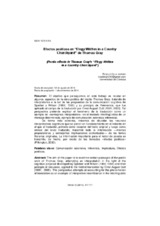Efectos poéticos en “Elegy Written in a Country Churchyard” de Thomas Gray
Poetic effects in Thomas Gray’s “Elegy Written in a Country Churchyard”
Autor
Villa Jiménez, Rosalía
Editor
UCOPressFecha
2014Materia
Comunicación ostensivaInferencia
Implicatura
Efectos poéticos
Ostensive communication
Poetic effects
Inference
Implicature
METS:
Mostrar el registro METSPREMIS:
Mostrar el registro PREMISMetadatos
Mostrar el registro completo del ítemResumen
El objetivo que perseguimos en este trabajo es recalar en algunos aspectos de la obra poética del inglés Thomas Gray, tratando de interpretarlos a la luz de las propuestas de la comunicación cognitiva de Sperber y Wilson (1986; 1995) y su principio de Relevancia, que fue aplicado al campo de la traducción por Ernst-August Gutt (1991; 2005). Tal perspectiva pretende explicar el fenómeno de la traducción como un ejemplo de «semejanza interpretativa» en el traslado interlingüístico de un mensaje determinado, ejemplo de comunicación ostensiva inferencial. De forma más concreta, tratamos de dilucidar los recursos interpretativos cognitivos que se ponen en funcionamiento en el instante en el que el traductor, primero como receptor del texto original y luego como emisor del texto traducido, transmite toda la información —mismas proposiciones y semejantes implicaciones contextuales— de los textos literarios originales. La información importante para el lector de poesía se transmite, de hecho, por medio de los llamados «efectos poéticos» (Pilkington, 2000). The aim of this paper is to examine certain passages of the poetic work of Thomas Gray, attempting an interpretation in the light of the cognitive proposal developed by Sperber and Wilson (1986; 1995) and their principle of relevance, applied to the field of translation by Ernst-August Gutt (1991; 2005). This perspective attempts at accounting for the phenomenon of translation as an example of interpretive resemblance in the interlinguistic exchange between any two languages, an instance of inferential ostensive communication. More specifically, we seek to account for the interpretive resources set in action while the translator, first as a receptor of the original text and then as a communicator of the translated text, puts all the information across — same propositions and resembling contextual implications— purported by the literary texts. Quite important information, in fact, for the reader of poetry is conveyed through the so-called “poetic effects” (Pilkington, 2000).

